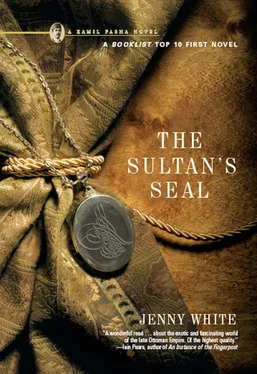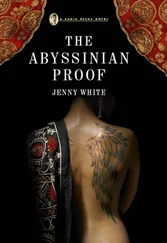Jenny White - The Sultan's seal
Здесь есть возможность читать онлайн «Jenny White - The Sultan's seal» весь текст электронной книги совершенно бесплатно (целиком полную версию без сокращений). В некоторых случаях можно слушать аудио, скачать через торрент в формате fb2 и присутствует краткое содержание. Жанр: Исторический детектив, на английском языке. Описание произведения, (предисловие) а так же отзывы посетителей доступны на портале библиотеки ЛибКат.
- Название:The Sultan's seal
- Автор:
- Жанр:
- Год:неизвестен
- ISBN:нет данных
- Рейтинг книги:5 / 5. Голосов: 1
-
Избранное:Добавить в избранное
- Отзывы:
-
Ваша оценка:
- 100
- 1
- 2
- 3
- 4
- 5
The Sultan's seal: краткое содержание, описание и аннотация
Предлагаем к чтению аннотацию, описание, краткое содержание или предисловие (зависит от того, что написал сам автор книги «The Sultan's seal»). Если вы не нашли необходимую информацию о книге — напишите в комментариях, мы постараемся отыскать её.
The Sultan's seal — читать онлайн бесплатно полную книгу (весь текст) целиком
Ниже представлен текст книги, разбитый по страницам. Система сохранения места последней прочитанной страницы, позволяет с удобством читать онлайн бесплатно книгу «The Sultan's seal», без необходимости каждый раз заново искать на чём Вы остановились. Поставьте закладку, и сможете в любой момент перейти на страницу, на которой закончили чтение.
Интервал:
Закладка:
He goes over the ground carefully, sweeping aside the leaves, but too much time has passed for there to be any sign of a struggle. Beneath a top layer of crisp brown leaves is a slick wet mulch of debris from previous years. He kneels beside the boulders and peers into the crevice. Deep inside the rock there is something light. He reaches in gingerly, but emerges only with scraped, muddy fingers. He takes off his jacket and rolls up his sleeve. This time, he forces his entire arm into the cleft. His fingers touch cloth. He snags it with the tips of his fingers and carefully pulls it out. It is a woman’s blouse. He scours the area systematically and discovers inside a hole, at shoulder height in the trunk of a tree, a pair of women’s lace-up shoes. Put there by someone who knows this forest well, he thinks. If the clothing is Mary Dixon’s, it would be a concrete link between her death and Chamyeri. Another link is Mary’s pendant. It fits into Hannah’s box, and Hannah was killed here. Mary and Hannah, linked by the sultan’s seal and a scrap of verse.
The shores of the pond are preternaturally still, except for a clearly etched ripple at the far end of the metallic water where it is fed by a spring. Kamil imagines Hannah Simmons floating in the black water, her clothes billowing about her. He looks at the slippery moss and layers of dank leaves with distaste.
His arms and face scraped and his trousers covered in mud, he returns to the city with the blouse and shoes wrapped in an oilcloth.
Michel carefully cleans the mud from the shoes and places them on the shelf in Kamil’s office next to the folded blouse and the items found in the sea hamam. Kamil stands for a few moments before the neatly displayed items as before a shrine. He is reminded that most things we choose to care about are fleeting. To dispel the melancholy that had begun to settle on him, he turns to Michel and suggests, “Shall we go to the coffeehouse? I think we’ve earned a rest.”
“I have a better idea,” Michel counters. “Let me take you to a very special eating house I know. Their Albanian liver is delicious. And the owner’s daughter is too,” he adds, laughing.
23
Some days after Papa and I fought over Amin Efendi’s marriage proposal, he invited his political friends to a soiree at our house. Aunt Hüsnü and I were to appear in Western dress and greet the guests, entertain them at dinner, and then withdraw, leaving them to discuss politics. I had listened to them before. On the evenings when Papa had guests, I moved quietly through the dark corridors and took up a position in a chair in the next room where I could hear their discussions. Servants are invisible even in the light, so Violet found reason to hover in the halls and warned me if anyone approached my hiding place. This rarely happened, though, since the men did not feel free to move through my father’s house, lest they trespass into the private realm in which women dwelled. We were only appropriate when on display. Otherwise, we were dangerous and forbidden fruit.
The men arrived, along with their wives. The women, stiff and uncomfortable in their unaccustomed corsets, adjusted the pearlseeded and embroidered veils that framed their open faces. They were dressed in the latest Paris fashion. The women’s eyes were lowered, whether from modesty or embarrassment was hard to gauge. They flocked toward Aunt Hüsnü and me, away from the men, and greeted us effusively, as if we had rescued them from a shipwreck.
Amin Efendi politely greeted all the women together, but his eyes locked onto mine. I was embarrassed and looked away, hoping no one had noticed. I could not imagine him as my husband. I could not imagine a husband in any case. I thought of my cousin Hamza. I thought of Papa’s exasperated voice behind closed doors. That was all I knew of men and husbands.
We walked in two flocks, men and women, to the parlor. The women clustered together on one side of the room. The men broke into twos and threes and thus took up more space, but did not move beyond the sofas, an unacknowledged boundary.
I heard the doors to the room creak on their hinges, and I heard the men’s voices in the room falter, then increase in volume. I turned to see Hamza standing inside the door. At first I didn’t recognize him. It had been seven years since the day he gave me the sea glass and went away, leaving me alone at Chamyeri. I had heard he was in Europe. His features were sharper, as if drawn by a knife. The thick curls I remembered were slicked back against the sides of his head. Permanent lines creased the space between his eyebrows, giving him a seriousness that I found intimidating. He looked leaner and more vital, like a spirited horse whose every small movement is a barely contained shorthand of great power.
He was looking at me, then turned his face to greet my father, who had walked up to him. Hamza leaned down to kiss Papa’s hand in the traditional manner of honoring one’s elders, but Papa pulled his hand away and reached it out to be shaken. I assumed Papa did not allow Hamza to kiss his hand because he had accepted him as an equal. But I caught sight of Papa’s face as he snatched his hand away, and afterward I was not so sure. There are many reasons not to allow someone to honor you.
Papa pulled him briskly to the men’s side of the room. Hamza shook hands all around, although I noticed a distinct lack of enthusiasm in the men’s brief nods of acknowledgment. Then Hamza turned and strode behind the couches and extended his arms to me. We leaned toward one another and kissed on both cheeks. We were, after all, cousins and childhood friends. His touch sent my pulse racing. The room was entirely still.
“How are you, Jaanan Hanoum?”
I was flustered by all the attention and curtsied as I had been taught. Aunt Hüsnü moved between us and directed Hamza toward the men waiting on the other side of the room. Heads began to move toward one another, a flutter of sound like birds taking wing. Defeating my effort to focus elsewhere, my eyes fled again and again to his face across the room.
PAPA WAS A modernist, but he was also a loyalist and the men expended great heat excoriating the Young Ottomans that they believed were undermining the empire with their talk of a parliament.
“The empire is being threatened and all men should speak with one voice. Otherwise our enemies will perceive our division as weakness and take advantage of it.”
The men clustered near the French doors open to the twilight garden. I could hear their conversation clearly through the chime and tinkle of women’s voices around me. Hamza sat nearest the garden, his face in darkness.
“It’s one thing to be modern,” my father expounded, “but it’s quite another to be a traitor to your sultan.” Several men cast pointed looks at Hamza.
“These journals spread vicious propaganda. All this talk of liberty and democracy promotes the separatist movements in the provinces and plays into the hands of the Europeans. The journals must be closed down and the radicals arrested.”
There was a general mutter of assent. Several men shifted uncomfortably in their chairs.
A distinguished, gray-bearded man turned toward my father. His broad chest was spanned by loops of gold braid and a sash gleaming with medals. Although he spoke slowly, weighting each phrase with the gravity of silence, no one interrupted.
“I agree. It’s quite possible to be civilized without aping the Europeans in everything they do. We don’t need a parliament. We have mechanisms that have worked perfectly well for five hundred years. Our experienced officials can do a much better job of running the government than a group of hotheaded young men uneducated in the principles of just rule. Who is to ensure that they promote the interests of the government and don’t misuse their power to support this group or that, undermining the unity of our glorious empire? Do we not already have an enlightened system that allows everyone in the empire, whether Muslim or minority, to thrive?” He extended his hand expansively. “Look around you. The sultan’s banker is an Armenian and his advisor on foreign affairs is a Greek. His physician is a Jew. Indeed, there is almost no work for us poor Muslims except in the army and behind a desk!”
Читать дальшеИнтервал:
Закладка:
Похожие книги на «The Sultan's seal»
Представляем Вашему вниманию похожие книги на «The Sultan's seal» списком для выбора. Мы отобрали схожую по названию и смыслу литературу в надежде предоставить читателям больше вариантов отыскать новые, интересные, ещё непрочитанные произведения.
Обсуждение, отзывы о книге «The Sultan's seal» и просто собственные мнения читателей. Оставьте ваши комментарии, напишите, что Вы думаете о произведении, его смысле или главных героях. Укажите что конкретно понравилось, а что нет, и почему Вы так считаете.












